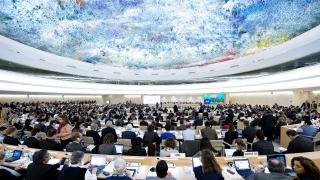
The 28th session of the Human Rights Council (HRC) concluded in Geneva last week with 34 resolutions adopted (20 by consensus) and three Presidential statements made.
The Council renewed or extended the mandate of seven Special Procedures – the UN’s independent human rights experts – and established two new mandates on the right to privacy in the digital age and the enjoyment of human rights by persons with albinism.
Eight panel discussions were also held as part of the 28th session, including the biennial high-level panel on the death penalty and a full day panel on human rights and climate change. Below is an overview of some of the outcomes of this session:
Country Specific
Syria
The HRC again expressed its condemnation of atrocities committed by all sides in the ongoing conflict in the Syrian Arab Republic, and called upon all parties to fully respect international law. The Council also praised the work of the Commission of Inquiry (COI) in Syria in supporting future accountability efforts and voted to extend the mandate of the COI by another year.
Israel/Palestine
In a resolution adopted by an overwhelming majority of 45 in favour to one against and with one abstention, the HRC affirmed “the inalienable, permanent and unqualified right of the Palestinian people to self-determination...and the right to their independent State of Palestine”. The Council also reiterated its support for a peaceful two-state solution.
Iran
The situation in Iran was noted with concern by the HRC, due to developments reported by the Special Rapporteur, Ahmed Shaheed, and the lack of access permitted to him to travel to the Islamic Republic of Iran. The Council extended Mr Shaheed’s mandate, and called upon the Iranian government to allow the Special Rapporteur to visit Iran and to provide all information necessary for the fulfilment of the mandate.
North Korea
The Council condemned “in the strongest terms the long-standing and ongoing systematic, widespread and gross human rights violations” in North Korea. In its resolution on the matter, the HRC decided to extend the mandate of the Special Rapporteur for a period of one year, and also to convene a panel discussion on the subject at its September 2015 session.
Thematic
Privacy in the digital age
Reflecting the growing concerns of UN member states, the HRC declared that the same rights that people enjoy offline must also be protected online, including the right to privacy. People should be free from arbitrary or unlawful interference with his or her privacy, family, home or correspondence. The Council thus decided to appoint, for a period of three years, a Special Rapporteur on the right to privacy, in order to focus on the protection of this right in connection with challenges arising from new technologies.
Genocide prevention
Reaffirming the significance of the Convention on the Prevention and Punishment of the Crime of Genocide as an effective international instrument, the Council called for the strengthening of existing mechanisms that contribute to the early detection and prevention of serious human rights violations. It also recommended that the General Assembly designate 9 December as the International Day of Commemoration and Dignity of the Victims of Genocides.
Drones
A resolution was passed inviting the UN High Commissioner, relevant Special Procedures and specific Treaty Bodies to pay due attention to violations of international law resulting from the use of armed drones or other remotely piloted aircraft. The vote was passed by 29 votes in favour, 6 against and 12 abstentions, with the UK voting against the motion,
This summary was compiled by Kieran Richardson, UNA-UK Policy & Advocacy Intern.
Photo: Wide view of the 23rd session of the Human Rights Council. © UN Photo/Jean-Marc Ferré






